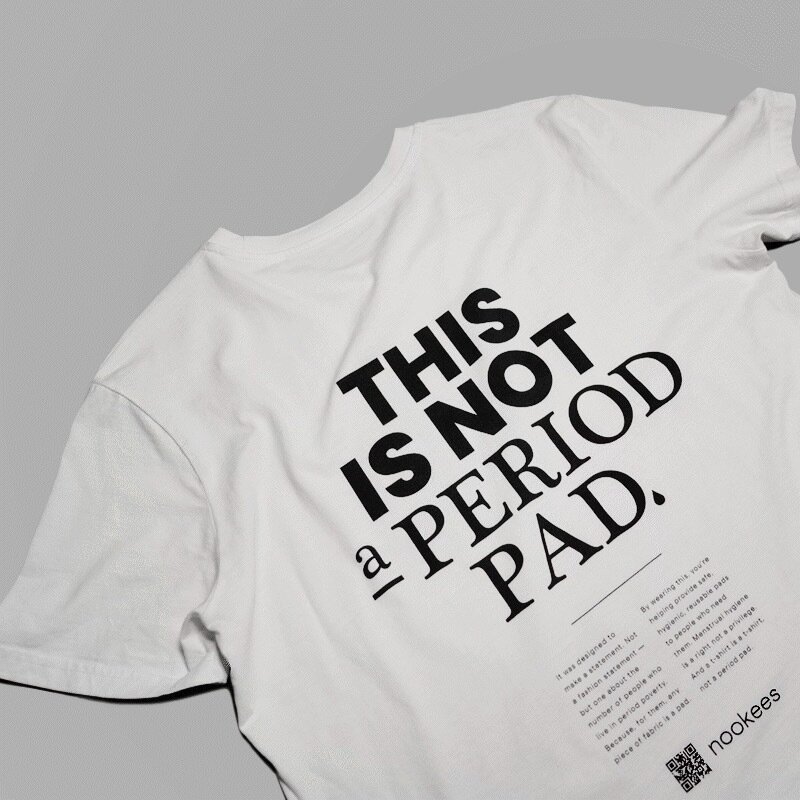Embracing Sustainability: A Guide to Eco-Friendly Menstrual Products
Menstrual Hygiene Day 2024
Menstrual Hygiene Day is an annual global awareness day that takes place on May 28th. It aims to highlight the importance of proper menstruation management, including access to hygiene products, education, and breaking stigma. The goal is to promote menstruator’s rights and improve their health and dignity.
Our efforts this Menstrual Hygiene Day
In honour of Menstrual Hygiene Day 2024, we're proud to collaborate with nookees to raise awareness about sustainable menstrual products and their foundation dedicated to ending period poverty worldwide by providing access to safe, hygienic, and ecological menstrual products and help those discriminated against by their periods.
Eco-friendly menstrual product alternatives offer a multitude of benefits for both individuals and the planet, making them an essential choice for those seeking a greener period experience. In this post, we want to explore why choosing sustainable menstrual products matters and take a look at some of the options.
Why do sustainable menstrual products matter?
Sustainable menstrual products are crucial in the fight against climate change, as they reduce the environmental impact of traditional disposable options, contributing to a healthier planet for current and future generations.
Here are just some of the benefits:
Environmental Impact
Traditional disposable pads and tampons contribute significantly to environmental pollution. Made from non-biodegradable materials like plastic and synthetic fibres, they linger in landfills and oceans for centuries. Did you know that one sanitary pad takes around 800 years to degrade naturally? Sustainable alternatives, such as menstrual cups, discs, reusable cloth pads, and period underwear, minimise waste and reduce the strain on our planet.
Plastic Waste Reduction
Disposable pads and tampons are often individually wrapped in plastic, exacerbating the global plastic waste crisis. Sustainable options like menstrual cups, discs, and reusable cloth pads eliminate the need for excessive packaging and single-use plastics, contributing to a more sustainable future.
Cost-Effectiveness
While the initial investment in sustainable products may be higher, they offer long-term cost savings. Menstrual cups, discs, and reusable cloth pads can last for years with proper care, eliminating the need for recurring purchases of disposable products. By investing in sustainable options, you can actually save money while reducing your environmental footprint.
Empowering Choice
Sustainable menstrual products empower individuals to make informed choices about their bodies and their impact on the environment. With the various sustainable options available today, menstruators can find products that align with their values and lifestyle preferences, rather than relying solely on the more traditional, less sustainable options that have plagued the market for years. Fortunately today, there are a lot of different types of sustainable, reusable menstrual product options available.
Before we go any further, let’s recap on what types of menstrual products there are in general.
There are two main types of period products: external protection (such as sanitary pads and panty liners) and internal protection (like tampons). Traditionally, these are one-time-use products, and not considered eco-friendly because of the plastic packaging, and materials they are made of. However, before we dive into the more sustainable, eco-friendly options, it’s important to remind you that the important thing with choosing a type of menstrual product, is that you are comfortable using it!
What eco-friendly, sustainable menstrual products are available?
Internal menstrual products
Menstrual Cups
A menstrual cup is a small, flexible cup that you insert into your vagina to collect menstrual fluid during your period. Unlike tampons or pads, which absorb the flow, the cup catches and collects it. The cup sits in the vaginal canal, just below the cervix. It forms a seal against the vaginal walls to prevent leaks. Menstrual cups are typically made out of medical-grade silicone, rubber, or elastomer, and are safe and comfortable to be worn for up to 12 hours at a time. Menstrual cups are reusable as they can be washed and sterilised after each use, allowing them to be used for multiple menstrual cycles, unlike disposable pads or tampons. Want to learn more about menstrual cups? Check out The Ultimate Guide to Menstrual Cups.
Menstrual Discs
Similar to menstrual cups, these discs are inserted into the vagina to collect menstrual flow. They are shaped like a flat, round disc with a flexible rim. They are placed in the vaginal fornix (the space behind the cervix) to collect the menstrual flow. The rim of the disc sits against the vaginal walls, preventing leaks. The disc is typically made of medical-grade silicone or elastomer. Menstrual discs generally have a higher capacity than most menstrual cups, holding more blood due to their larger surface area. Check out this blog post to read more about menstrual product capacity, and which are the best products for heavier bleeding. Like menstrual cups, discs can be cleaned and sterilised in between uses as they are reusable.
Tampons
Tampons, stick-like menstrual products, are made from absorbent materials designed to be inserted into the vaginal canal. These materials typically include a combination of plastic, rayon, cotton, and synthetic fibers. Additionally, tampons are often individually wrapped in plastic, and some may even include a plastic applicator to reduce direct contact with menstrual blood and genitalia. As a result, up to 90% of tampons may consist of plastic. Given their single-use nature and the large quantities used annually by menstruating individuals, plastic-based tampons have a significant environmental impact.
For those who prefer tampons, there are now more eco-friendly options available. Some tampons are made from 100% organic cotton, which is naturally absorbent and biodegradable, unlike traditional plastic-based tampons that can take up to 800 years to decompose. Organic cotton tampons are also typically fragrance-free, free of harmful chemicals, and hypoallergenic, making them better for both vaginal health and individuals with sensitivities. It's important to check product packaging to ensure it meets your specific needs, as not all organic cotton tampons are hypoallergenic.
To further reduce waste, there are non-applicator tampons that can be easily inserted with fingers. For those who prefer or require an applicator, brands are offering eco-friendly alternatives, such as cardboard applicators. Additionally, reusable tampon applicators, like those offered by DAME, provide a sustainable option for menstrual care.
Looking ahead, innovations like the Kelpon from Vyld offer the promise of a tampon that benefits both the environment and the user. Made from seaweed, the Kelpon represents a revolutionary step towards a more sustainable future in menstrual product design. Learn more about this exciting innovation [here].
External menstrual products
Period Underwear
Period underwear offers a sustainable alternative to disposable pads, featuring built-in absorbent layers for leak protection. Not only are they eco-friendly and reusable, but they also provide several advantages over traditional pads. Designed for comfort and discretion, period panties eliminate the bulky feel often associated with disposable pads. With proper care and washing according to manufacturer guidelines, a single pair of period underwear can last between 2 to 5 years, offering long-term savings compared to purchasing disposable pads regularly.
Reusable Cloth Pads
Reusable cloth pads are eco-friendly alternatives to disposable menstrual products, that are placed inside your underwear similar to disposable pads. Made from soft materials like organic cotton, they come in various absorbency levels and are easy to wash. Both cost-effective and sustainable, cloth pads provide a comfortable way to manage menstruation.
nookees: the world's first click-in system for menstrual underwear
nookees is a period underwear brand inspired by the founder’s global travels and experiences, that have created a innovative, comfortable, and sustainable period product.
Click-In System: nookees period underwear features a unique click-in system. The underwear (known as THE PANTY) has snap buttons, and you can easily and securely attach the reusable period pads (called THE PAD) to it.
Comfort and Sustainability: nookees PANTY is designed for all-day comfort. Made of lyocell, it feels like regular underwear but offers leak-proof protection. The pads are washable, toxin-free, and made from certified fabrics.
Mission: The mission extends beyond creating comfortable period products. Not everyone has access to safe and hygienic menstrual products, which results in many people around the world being discriminated against because of their menstruation. The founder of nookees, Janina Breitling aims to change this situation for menstruators in the global south with The nookees Foundation.
The nookees Foundation
Supporting two projects, the foundation will help provide menstruating people with access to safe, hygienic, and ecological period products, whilst also providing education and therefore reducing the negative stigma associated with menstruation.
As well as their sustainable menstrual products, nookees also have a “This is not a period pad” collection, which highlights the current issue of a lack of proper menstrual products, with 10% of proceeds going directly to the nookees foundation.
To find out more about nookees and their foundation, click here: The nookees Foundation.
In summary, opting for sustainable menstrual products benefits both individuals and the planet. By embracing eco-friendly alternatives like menstrual cups, discs, reusable cloth pads, period underwear, and innovative concepts like Vyld's seaweed-based tampons, we can reduce waste, protect our health, and promote positive change in the menstrual product industry. This Menstrual Hygiene Day, let's celebrate sustainable period solutions and work towards a healthier, more sustainable future for all. 🌱





